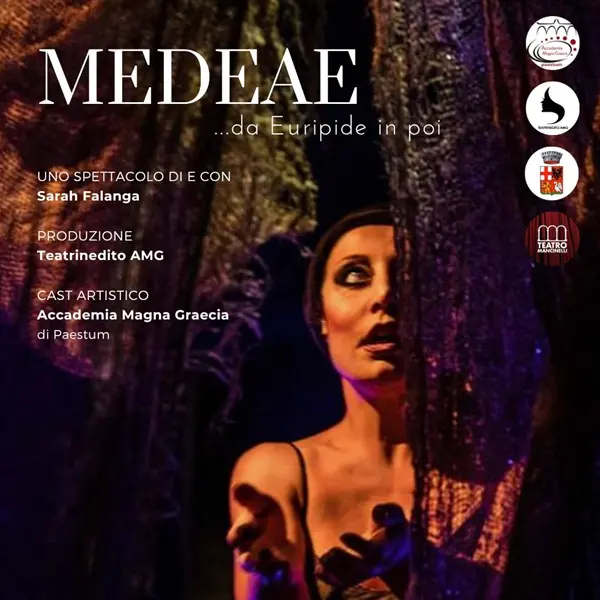Medeae da Euripide in poi...
- Teatro Mancinelli - Orvieto (TR) Map
- Available
- Starting from:
25.50€
E-ticket (PDF)
You will receive the ticket in PDF format directly via email
Event information
MEDEA… so that there is NEVER a distance between the audience and the "scenic event,"
which instead envelops them, making them intimately involved.
We all breathe together, we exchange the deepest truths
of being... we touch each other's eyes! The audience is the protagonist of the
stage, which knows no distance. It wouldn't make much sense for me to create
a different kind of theater, right now! The audience doesn't want lies, only
truth. Theater needs to awaken vibrations, emotions... Actors
must put themselves intimately at stake (we don't want performances, but
INTERpretations). The characters want to be real. I believe that if
people don't vibrate, don't shiver, don't get excited, don't get moved
recognizing themselves on stage, they don't find the reason to join us at the theater, to
buy a ticket... In short, it has to be worth it! Being an ACTOR
is a social and civil mission, which distances itself profoundly from other
forms of entertainment. HUMANITY needs humanity... especially
in this era of "SOLITARY AND INTENTIONALLY
SILENT VIRTUALITY"! I won't be the one Save MAN, but culture, yes!
In the title of the show, the Latin genitive of the name (Medea, ae), meaning "of
Medea": an intense and delicate succession, linked by a thread of blood, of
how much literature of all time has dedicated to Medea. It is the journey of
Medea, the "global" vision of the role this character has had over
the centuries. Euripides certainly played a decisive role. In fact,
he marks a watershed between two different ways of interpreting this figure.
The central element of the legend of Medea, or rather what had
become central after Euripides, infanticide, was an innovation by the
Athenian tragedian compared to the previous tradition. After 431
BC, Euripides' representation exerted its influence on
subsequent literature. Euripides, Seneca, Grillparzer, Alvaro, Pasolini,
even Christa Wolf, are companions on this theatrical journey to Medea,
to convey everything we have learned about Medea over the centuries.
I'm fascinated by the attempt to delve, as far as possible, into the foundations of all these traditions, not with a scientific approach, but as an actress and director, with imagination and fantasy nourished by a broad knowledge of this figure's living conditions.
Medea has lived the eternal tragedy of having to stage her story, from all eternity, that is, from the time her name was first written, now famous among the gods and men of all time. Every time there is an audience, as in a Dantean circle, she will be forced to relive her tragedy, her betrayal, her pain, and the ultimate act of lucid and conscious infanticide. The beginning of the show is generated by the end of one who, just before, ended.
At the sight of a new audience, the character prepares to relive everything, to tell her story to new women and new men. "It is a pain that does not want to pass, a duty given by her very nature."
All the authors of Medea supported the adaptation of the text (curated by Sarah Falanga herself),
which is staged with a light, linear, and modern approach in both its essence and staging.
The stage is a ring within which the audience is enthralled. Having lost its usual dimension, breaking the "fourth wall," the spectator is at the center of the story, just as happens in the soul of those who find themselves forced to relive their drama every time the theater demands it, or rather, every time the "duty of catharsis" evokes the essence of a theatrical character. On stage, seven Medea relive the torment of murder as a last resort, until they reach the epilogue that closes the circle, presaging a new beginning... the uninterrupted rhythm of an experience that the character has been destined to offer the audience for centuries and from which she cannot escape (a destiny she cannot ignore). And in this cycle lies eternal torment, from which, by its very nature, she cannot escape, despite the extreme suffering of each performance.
Production: TEATRINEDITO AMG & ACCADEMIA MAGNA GRAECIA
Event organizer: a. c. Teatrinedito AMG
Teatro Mancinelli - Orvieto
The Mancinelli Theater is an important artistic and historical symbol of the city of Orvieto. Located in the center, a short distance from the Duomo and the main square, it was inaugurated in 1863. The hall, with the shape of an Italian theatre, has four tiers of stages, a loggia and has a horseshoe plan . It can accommodate approximately 600 people.
Buy online
Purchasing online with your credit card is safe and reliable on our site. We employ advanced security measures, such as SSL encryption, to protect your data. Every transaction is monitored to prevent fraud, ensuring your peace of mind. We respect your privacy and offer dedicated customer support for any questions or problems. Shop with confidence, knowing that your safety is our priority.

How to use the Electronic Ticket
This is a digital ticket in pdf format, which in all respects replaces the paper ticket.
- Receive the ticket in .pdf format directly via email
- Show your electronic ticket directly from your smartphone at access control
- It is not necessary to print the ticket
Tags: Medeae da Euripide in poi..., Teatro Mancinelli - Orvieto
